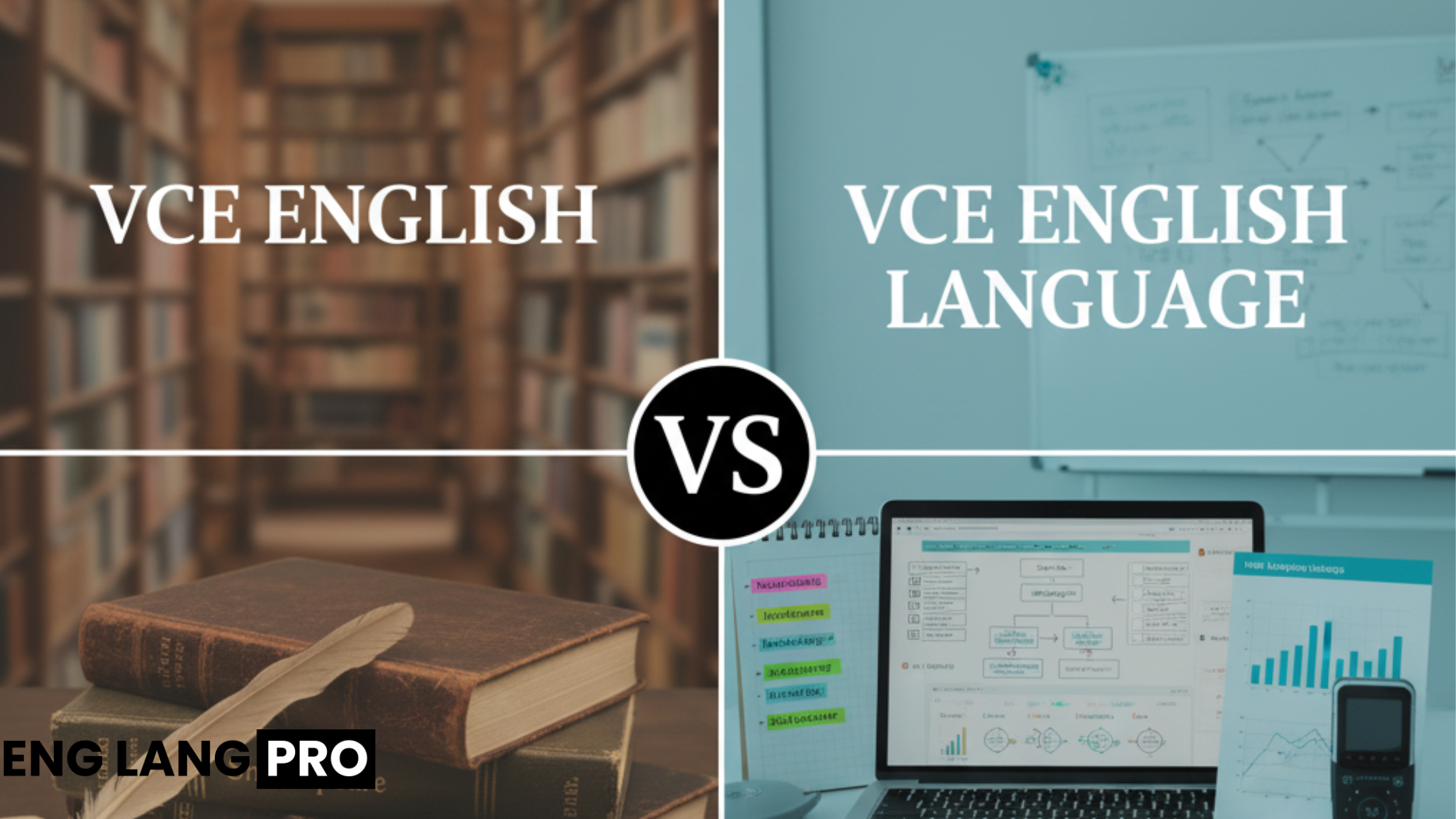Difference Between VCE English and VCE English Language – Which One Should You Choose?
Introduction
Choosing your VCE subjects can feel like one of the biggest decisions of your school life. And when it comes to English, the choice is even trickier. Every student has to complete at least one English subject, but you might be wondering: Should I take VCE English or VCE English Language?
On the surface, they sound similar. Both count towards your compulsory English requirement, both are assessed by VCAA, and both involve plenty of writing. But in reality, they’re very different subjects — with different skills, assessments, and challenges.
In this guide, we’ll unpack exactly what each subject involves, break down the key differences, and give you some practical advice on choosing the option that best suits your strengths and goals.
What Is VCE English?
VCE English (often called “mainstream English”) is the most common pathway. It looks familiar because it builds on the style of English most students studied in Years 7–10.
What you’ll focus on:
Text response essays → analysing themes, characters, and ideas in set novels, plays, or films.
Creative writing → writing original or adapted pieces, often linked to your studied texts.
Language analysis → breaking down persuasive techniques in opinion pieces or speeches.
Skills you’ll develop:
Close reading and interpretation.
Essay writing with a strong contention and evidence.
Creative expression and adaptation of style.
Who it suits best:
Students who enjoy storytelling and analysing characters.
Students who like flexible, interpretive writing tasks.
Those who prefer less technical content and more creativity.
In short, VCE English rewards creativity, interpretation, and persuasive writing.
What Is VCE English Language?
VCE English Language is a completely different approach. Instead of focusing on novels or plays, this subject is about the science of how language works. Think of it as applied linguistics at a VCE level.
What you’ll focus on:
Metalanguage → the technical vocabulary used to describe language (phonology, syntax, discourse, semantics, lexicology).
Analytical commentary → unpacking transcripts, speeches, or written texts in detail.
Essays → discussing language change, variation, identity, and attitudes towards Australian English.
Skills you’ll develop:
Technical precision with metalanguage.
Analytical and structured thinking.
Application of linguistic theory to real-world examples.
Who it suits best:
Students who like structure and logical analysis.
Students interested in real-world applications (slang, politics, advertising, media).
Those who are comfortable learning terminology and applying it in exam conditions.
To see exactly what’s covered, explore the official VCE English Language study design.
Key Differences Between English and English Language
It’s easier to compare these subjects side by side:
| Aspect | VCE English | VCE English Language |
|---|---|---|
| Focus | Literature, creativity, interpretation | Linguistics, analysis, technical precision |
| Main Assessments | Text response, creative, language analysis | Short-answer questions, commentary, essays |
| Skills Needed | Interpretation, creative writing, persuasive analysis | Structured thinking, use of metalanguage, applying theory |
| Exam | Three essays | SAQs + commentary + essay |
| Difficulty | More familiar, but marking can feel subjective | More technical, scales favourably |
| Who It Suits | Students who enjoy stories, characters, creative tasks | Students who enjoy structure, analysis, real-world examples |
In simple terms:
VCE English = interpretation of literature and persuasive writing.
VCE English Language = analysis of how language works in the real world.
Which Subject Should You Choose?
There’s no one “better” subject — it depends entirely on your strengths and preferences.
Choose VCE English if…
You enjoy reading and analysing books, plays, or films.
You like writing creatively or imagining different perspectives.
You’re stronger at interpretation than technical analysis.
You’d rather avoid heavy terminology.
Choose VCE English Language if…
You’re curious about how language changes, varies, and builds identity.
You like logical, structured thinking (similar to sciences).
You’re happy to learn and apply technical terms (metalanguage).
You enjoy real-world examples (ads, political speeches, slang).
If you’re leaning towards English Language, check out our free VCE English Language resources to see if it feels like a good fit.
Remember: Both are valid options. Universities accept both equally, and both count towards the compulsory English requirement. The best choice is the one that matches how you naturally think and write.
Common Myths About English vs English Language
❌ “VCE English Language is easier.”
✅ It’s not easier — just different. VCE English requires interpretation and creativity, while VCE English Language requires technical accuracy and analysis.
❌ “Universities don’t accept VCE English Language.”
✅ False. Both VCE English and VCE English Language fulfil the compulsory English requirement for VCE.
❌ “You need to be good at maths/science to succeed in VCE English Language.”
✅ Not at all. While analytical skills help, what you really need is consistency and a willingness to practise applying metalanguage.
Conclusion
So, what’s the difference between VCE English and VCE English Language? In short: one is rooted in literature and creativity, while the other is rooted in linguistics and analysis. Both are respected, both are valuable, and both will stretch your writing and thinking skills in different ways.
When choosing, don’t just look at scaling or what your friends are doing. Think about what excites you more: pulling apart texts and themes, or analysing the mechanics of language in real-world contexts.

